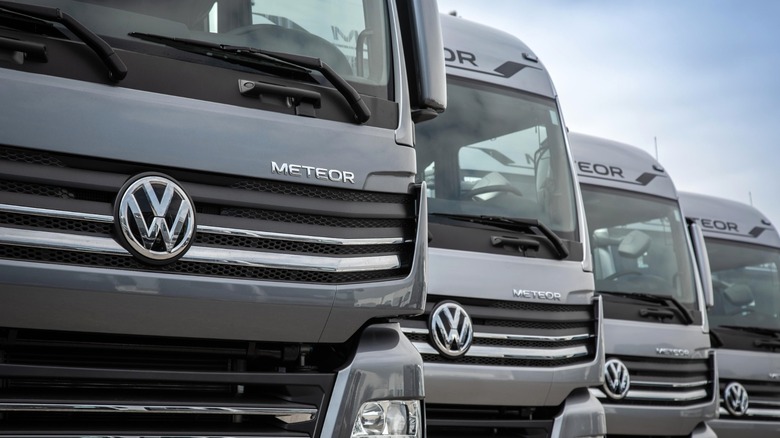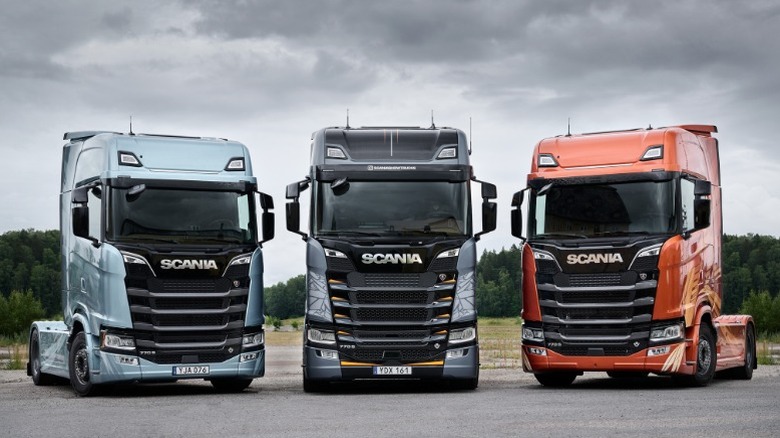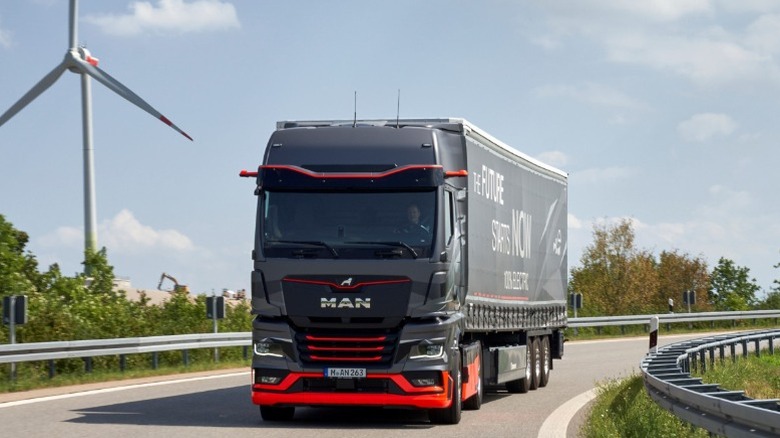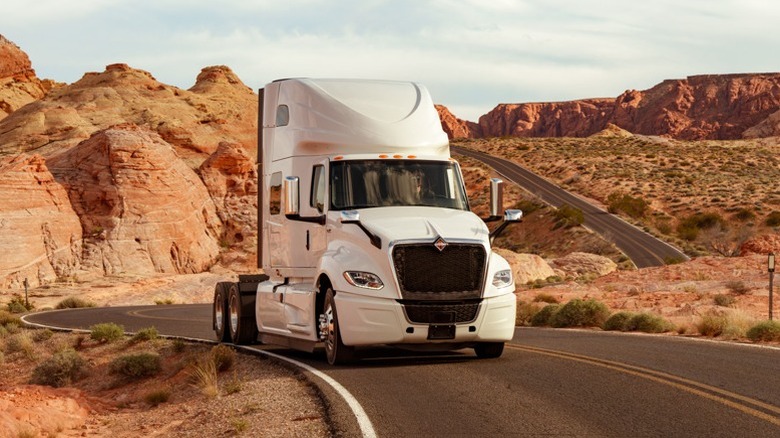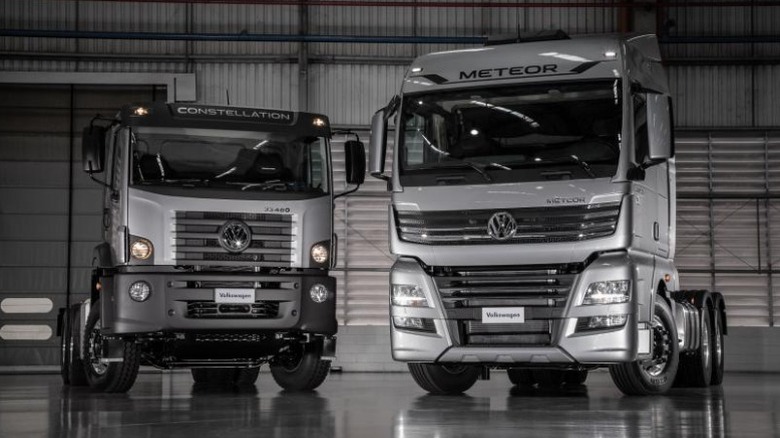4 Major Semi Truck Brands Owned By Traton
Corporate ownership is a reality of the world we live in. Many of the brands we encounter in our daily lives are owned by other brands, some of which, in turn, are owned by other brands. Amazon, for example, owns a wide range of sites and services, some of which you may not have realized are Amazon companies. But at least Amazon is a parent company most of us will recognize. When it comes to the world of heavy-duty and long-haul trucking, that isn't always the case.
Traton is a perfect example. Whereas some other trucking companies, such as Paccar, produce products and components, Traton likely isn't going to be a name you spot when you take a cursory look at a semi-truck. But that doesn't mean Traton is a small company. Traton is a division of the larger Volkswagen Group — giving its parent company the honor of being one of the few car brands that also makes semi-trucks — and was formerly known as Volkswagen Truck & Bus GmbH from 2015 to 2018.
Traton's history, and that of the brands it owns, is a somewhat complex series of name changes, investments, and acquisitions, which we'll cover as we look at the separate brands under its ownership. But what you need to know for now is that Traton currently owns four big names in the trucking space, with its footholds in Europe, North America, and South America making it one of the three primary manufacturers of commercial vehicles alongside Daimler Truck and the Volvo Group.
Scania
Let's start with the first European semi-truck brand to come under the Traton (or Volkswagen) umbrella, Scania. Scania has existed for longer than Volkswagen itself, having first come together in 1911. It would later link up with Volkswagen in 1948, becoming the German company's Swedish distributor in the immediate aftermath of WWII. Don't think it was a straightforward journey between that and becoming a Volkswagen brand, though. Scania's first corporate alliance was with Saab in 1969, and the Scania-Saab union existed until 1995, when the two went their separate ways.
This would pave the way for Volkswagen to make its first steps into the European trucking world in 2000, paying a cool $1.6 billion for 18.7% of the truck-maker's capital and 34% of the voting rights. The next few years saw Scania introduce a new truck, the R-series, and link up with Cummins to create the Scania XPI fuel injection system. It wasn't smooth sailing for Volkswagen, though, as German semi-truck brand MAN attempted to join the party in 2006, making a cash-and-stock offer worth around $12.1 billion. Volkswagen would retaliate by going on the offensive, but we'll talk about that later.
Having fended off MAN's bid, Volkswagen would take a controlling share in Scania in 2008, paying $4.37 billion to gain 68.6% of the Swedish company's voting rights. It would eventually acquire Scania outright in 2014. Firmly ensconced within the Volkswagen family, Scania released an award-winning update to its R-series trucks in 2009 and became part of the green big rig movement with an electric truck in 2020.
MAN Truck & Bus
The MAN name goes back to a 1898 union of German companies from Augsburg and Nürnberg that eventually took on the MAN name (short for "Maschinenfabrik Augsburg-Nürnberg") in 1908. MAN survived both wars reasonably well, relocating to a factory in Munich-Allach in 1955 and churning out its 100,000th truck just 10 years later. It would soon start expanding, acquiring German company Büssing in the 1970s and broadening its customer base beyond Germany over the next few decades.
The German company continued to grow and was doing well for itself in the 2000s, posting record profits in 2005. It's from this position of strength that it attempted to purchase shares in Swedish rival Scania, offering $12.1 billion in cash and stocks to Scania shareholders, including Volkswagen. Scania rebuffed the offer, and, just a month later, Volkswagen announced that it had paid the equivalent of $1.87 billion for a 15% share in MAN. Contemporary reports suggested that this would allow for a three-way link between Scania, VW, and MAN — and that's precisely what happened.
It took until 2011 for VW to gain a majority 56% share of MAN, which increased to 75% in 2012. Volkswagen established Volkswagen Truck & Bus GmbH in 2015. MAN has continued to build trucks and buses — with a recent focus on EVs such as its eTGX semi and digital technology, including automation — in the years since, although it technically ceased to exist as a company after Traton squeezed it out with a merger in 2021.
International
We shift from the Old World to the New World and the newest brand to join the Traton family. The International name is steeped in history, tracing its origins to the McCormick reaper of 1831 and encompassing vehicles such as International Harvester's (IH) classic Scout — which, in case you missed it, is coming back courtesy of Volkswagen — and a range of pickups that died out in the mid-1970s.
But pickups were never International Harvester's stock in trade; that was heavy-duty machinery, from tractors to trucks. The company was considered the U.S.' biggest maker of heavy-duty trucks by the time the mid-1980s rolled around, but that period was also one of significant change for IH. It sold its agricultural division to Tenneco in 1984, before renaming itself Navistar International Corporation in 1986. Despite that, Navistar continued to use the International name for its trucks and kept itself afloat over the next few decades, even as early 2010s struggles forced it to close some of its manufacturing facilities.
First contact with Volkswagen occurred in 2016, when Traton (then known as Volkswagen Truck & Bus GmbH) acquired 16.6% of the company. Traton then took complete control of Navistar in 2021 in a deal worth $3.7 billion. Navistar — with Traton's help — soon unleashed its S13 Integrated Powertrain, which debuted for Navistar's range of heavy trucks in 2022. Navistar renamed itself to International in October 2024 and continues to build its products in the U.S. and Mexico under Traton's ownership.
Volkswagen Truck & Bus
Not to be confused with Traton's former name, Volkswagen Truck & Bus GmbH, this particular Volkswagen Truck & Bus started life as Volkswagen Caminhões e Ônibus (VWCO), established after the German company fully took over Chrysler's Brazilian operations in 1980. Volkswagen's Brazilian arm immediately launched a range of VW-branded trucks, exporting them to markets such as Paraguay, Mexico, and Germany.
By 1994, VWCO had built its 100,000th truck and debuted the popular Volksbus, which is an actual bus, mind you, and has nothing to do with the iconic road trip vehicle that is the VW Bus. The company's upward trajectory continued, and it became a leading truck manufacturer in Brazil soon after the turn of the millennium, in 2001. Despite its success in the 2000s, however, Volkswagen sold VWCO to German truck manufacturer MAN in 2008. VW itself already had a stake in MAN then, and had even expanded its initial 15% share to about 30% by the time the deal went through.
VWCO thus left the Volkswagen fold and became MAN Latin America in 2009, but that didn't last long. When the Volkswagen Group acquired its majority stake in MAN in 2011, VWCO came with it, and the Brazilian truckmaker was once again part of the greater Volkswagen family. It's only after this reunion that VWCO launched its first heavy-duty semi-trucks, the Meteor and the Constellation, in 2020, the same year it built its millionth vehicle. In 2022, Volkswagen Caminhões e Ônibus was renamed Volkswagen Truck & Bus.
